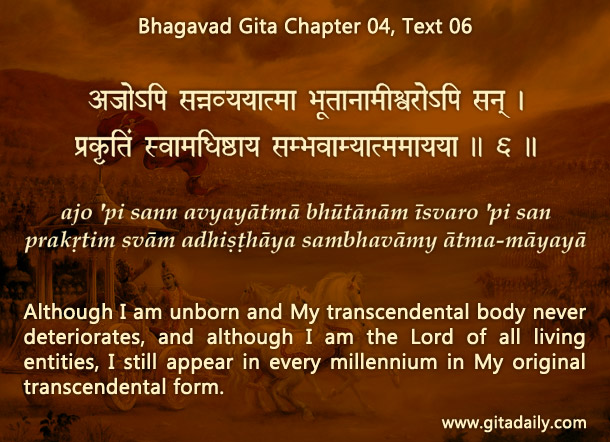The English word “incarnation” is derived primarily from Abrahamic theology – it describes Jesus who, Christianity holds, is God descended in flesh as a human being.
As this word is common in mainstream religious diction and discourse, many bhakti teachers often use it for introducing contemporary audiences to the concept of avatara. However, the word incarnation has a denotation that contradicts an essential bhakti understanding of the nature of avatara. “Incarnation” literally means “to come in flesh”; the root “carna” is seen in words such as carnivorous animals (flesh-eating animals) and carnal desires (desires to enjoy the flesh). However, when Krishna descends to this world, he doesn’t descend in a form of flesh; he appears in his transcendental form. The Bhagavad-gita (04.06) declares that he remains the imperishable Lord of all living beings, even when he descends here. This declaration implies that he doesn’t come under the control of material nature, which sentences all embodied beings through time’s inexorable flow to bodily deterioration and destruction.
Given Krishna’s transcendence, his avatar may be better described as a descent. He exists eternally in the spiritual world and manifests in this world during the period when he reveals his lila here. Pertinently, the word avatara literally means one who comes down or descends.
Bhakti teachers avoid burdening us with a double unfamiliarity: both an unfamiliar term and an unfamiliar concept. Terms are verbal handles for mental concepts. By first giving us a familiar handle to grasp an unfamiliar concept and then explaining the concept’s unfamiliar dimensions, they help us move towards comprehension, one step at a time. Such comprehension culminates in spiritual devotion when we understand how charming and loving Krishna is: charming in manifesting eternally as an accessible, attractive Supreme Person; and loving in revealing that manifestation in this world for attracting and delivering us.
To know more about this verse, please click on the image
Explanation of article:
Podcast:


Leave A Comment